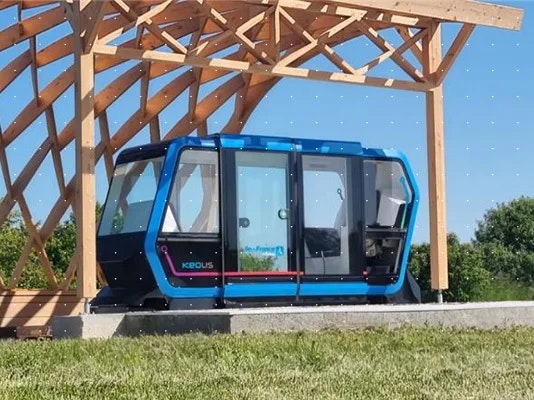Following a successful debut season in 2024, Urbanloop SQY, serving the Trappes-Saint-Quentin-en-Yvelines leisure park, is to reopen to the public seven days a week during the summer, starting on Saturday 12 April. The service will run until mid-November. Urbanloop is a young 30-employee business that offers a resolutely innovative zero-carbon, battery-free transport solution.
Developed by Urbanloop, operated by Keolis and supported by the Saint-Quentin-en-Yvelines (SQY) joint council, this project was first introduced on 27 July 2024 for the Paris Olympic and Paralympic Games to carry spectators to the fan zone located in the SQY leisure park.
The system consists of a 2-km loop running between the park entrance and the Maison de l’Environnement. The individual autonomous capsules run on demand, with no waiting time or connections, providing a smooth, quiet and entirely carbon-free mobility experience.
Catering to more than 10,000 passengers over the space of two months during the experimental phase, and more than 13,000 to the end of 2024, Urbanloop SQY offers evidence of the public’s growing interest in this mobility solution of the future. The second season of trials will allow testing to continue in real-life conditions, providing further technical and operational insights with a view to deployment on a larger scale.
The Urbanloop technology has already received recognition outside France, with the recent signature of a contract in the United Arab Emirates for the deployment of a pilot project in Abu Dhabi. In France, the first regular service is scheduled to launch in Nancy in 2027 with a 7-km loop, 40 capsules and several stops, whose purposes include connecting a park-and-ride facility with the new trolleybus line.
For Keolis, this experimentation illustrates its commitment to supporting communities in their shift towards sustainable smart mobility solutions suited to individual needs.
Chiffres clés
- 10,000passengers carried in the 2 months after launch
- 2passengers per capsule (or 1 passenger + bike)
- 220people per hour can be conveyed at any one time
- 0,47 €/kmthe world’s lowest ever energy consumption for an autonomous rail-mounted vehicle.
